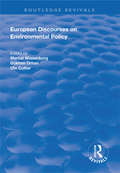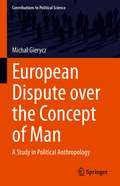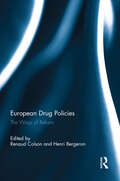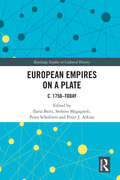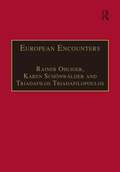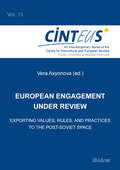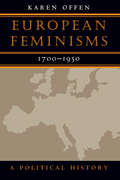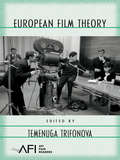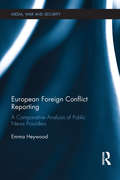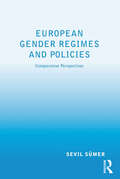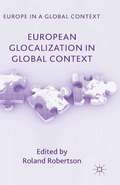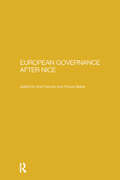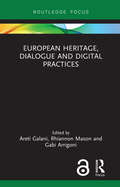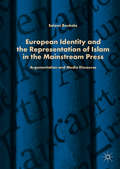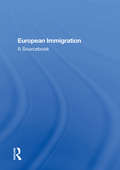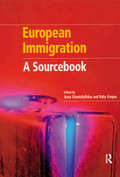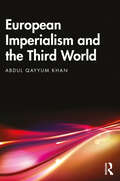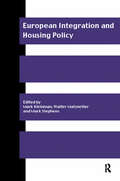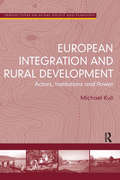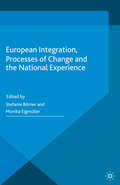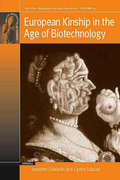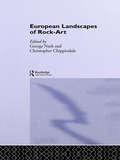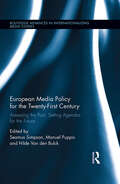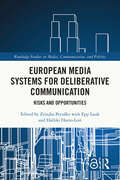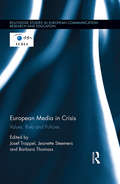- Table View
- List View
European Discourses on Environmental Policy (Routledge Revivals)
by Marcel Wissenburg Gökhan Orhan Ute CollierFirst published in 1999, this volume contributed to the debate on the European Union in furthering the study of environmental policy and, expressly, by introducing promising young scholars to the debate. The volume is based on a series of seminars for the Interdisciplinary Research Network on Environment and Safety (IRNES) with funding from the UK Economic and Social Research Council (ESRC). These new scholars explore areas including post-decisional politics, sustainability and agricultural biotechnology regulation.
European Dispute over the Concept of Man: A Study in Political Anthropology (Contributions to Political Science)
by Michał GieryczThe book represents original research in a field of study rarely pursued while analysing the intellectual dimensions of disputes over ethically sensitive issues that occur in European Union politics. These disputes are generally analysed at ideological, ethical, economic and interstate levels. However, these references do not suffice in understanding the issue, which is related to a divergent perception of the essence of humanity and thus the subject matter of anthropology. The main research objective of the monograph is therefore to reconstruct the sources and the specific European Union way of thinking about the human being. Methodologically, the book expands the understanding of political anthropology within political science and presents a range of suitable instruments for pursuing anthropological research. At the theoretical level, it proposes an anthropological typology of the main currents of European political thought and reveals their prominence for the anthropological orientation of the EU's axiology. Empirically, it provides an analysis of the anthropological features of European Union institutions and policies in addition to discussing the relation between the axiological and anthropological positions of the main political and national groups within the EU.
European Drug Policies: The Ways of Reform
by Renaud Colson Henri BergeronThe drug control regime established by the international community has not succeeded in curbing either the demand for, or the offer of, narcotics. But, despite a series of developments in the Americas – including the legalisation of cannabis in Uruguay and in several states in the United States of America – there is still little support in Europe for repealing drug-prohibition laws. Nevertheless, a gradual policy convergence reveals the emergence of a European model favouring public-health strategies over a strictly penal approach to combatting drugs, while growing transnational support for legalisation indicates the persistence of an alternative paradigm for drug policy. This book examines the various influences on drug policies in Europe, as grassroots movements, NGO networks, private foundations and academic research centres increasingly confront the prevailing discourses of drug prohibition. Pursuing an interdisciplinary approach and bringing together legal scholars, social scientists and practitioners, it provides a comprehensive and critical assessment of drug policy reform in Europe.
European Empires on a Plate: c. 1750–Today (Routledge Studies in Cultural History)
by Peter Scholliers Peter J. Atkins Ilaria Berti Stefano MagagnoliThis book uses food to explore the uneven and multifaceted encounters between European imperial societies and their colonies, examining the cultural, social, political and economic forces behind European empires.Food is a key focus of current transdisciplinary and border research, and these chapters uncover hidden aspects of imperial dynamics and the search for food in European expansion. Containing contributions from a mix of established food historians and young researchers in the field, the collection utilizes a range of sources including colonial government records, trademark and patent records, cookery books, agronomic and botanical treaties, television shows, newspaper and magazine articles and advertisements. While the book discusses empires’ influence on the colonies and their foodways, it also reveals inter-imperial connections and interdependence by highlighting the effect of colonial foods on the metropoles.European Empires on a Plate is a valuable resource for scholars in the fields of food history, food studies and food culture, as well as social and cultural historians.
European Encounters: Migrants, Migration and European Societies Since 1945 (Research in Migration and Ethnic Relations Series)
by Karen Schönwälder Rainer OhligerThis book reminds us of Europe's multi-faceted history of expulsions, flight, and labour migration and the extent to which European history since 1945 is a history of migration. While immigration and ethnic plurality have often been divisive issues, encounters between Europeans and newcomers have also played an important part in the development of a European identity. The authors analyze questions of individual and collective identities, political responses to migration, and the way in which migrants and migratory movements have been represented, both by migrants themselves and their respective host societies. The book's distinctive multi-disciplinary and international approach brings together experts from several fields including history, sociology, anthropology and political science. ’European Encounters’ will serve as an invaluable tool for students of contemporary European history, migration, and ethnic identities.
European Engagement Under Review: Exporting Values, Rules, and Practices to the Post-Soviet Space (An Interdisciplinary Series of the Centre for Intercultural and European Studies #15)
by Vera AxyonovaThis timely book seeks to contribute to the debate on the transfer of values, rules, and practices by European actors to former Soviet countries. The actors in focus include multilateral organizations, such as the European Union, the Council of Europe, and the Organization for Security and Cooperation in Europe, as well as European governments and non-governmental organizations. The contributions in this collection address different aspects of the export or transfer of values, such as democracy, human rights, and the rule of law, as well as rules and practices in the fields of education and migration management, examining the motives, mechanisms, and effects of European engagement.
European Feminisms, 1700-1950: A Political History
by Karen OffenThis ambitious book explores challenges to male hegemony throughout continental Europe. It focuses especially on France, but it also offers comparative material on developments in the German-speaking countries and in the smaller European nations and aspiring nation-states. Spanning 250 years, the sweeping coverage extends from Portugal to Poland, Greece to Finland, Ireland to Ukraine, and Spain to Scandinavia--as well as international and transnational feminist organizations. The study has several objectives. For general readers and those interested primarily in the historical record, it provides a comprehensive, comparative account of feminist developments in European societies, as well as a rereading of European history from a feminist perspective. By placing gender, or relations between women and men, at the center of European politics, where the author argues that it belongs but from which it has long been marginalized, the book aims to reconfigure our understanding of the European past and to make visible a long but neglected tradition of feminist thought and politics. On another level, by providing a broad and accurate historical analysis, the book seeks to disentangle some misperceptions and to demystify some confusing contemporary debates about the Enlightenment, reason, nature, equality vs. difference, and public vs. private, among others. The author argues that historical feminisms offer us far more than logical paradoxes and contradictions; feminisms are about sexual politics, not philosophy. Feminist victories are not, strictly speaking, about getting the argument right, nor is gender merely "a useful category of analysis"; sexual difference lies at the heart of human thought and politics.
European Film Theory (AFI Film Readers)
by Temenuga TrifonovaEuropean Film Theory explores the ‘Europeanness’ of European film theory, its philosophical origins, the ‘culture wars’ between ‘Continental’ and ‘Analytical’ film theory and philosophy, the major discursive and epistemological shifts in the history of Continental film theory, the relationship between Continental philosophy of art and philosophy of history and European film theory. Writing from a range of disciplines and perspectives, the contributors to this new volume in the AFI FILM READERS series offer fresh interpretations of European film theorists and illuminate the political potential of European film theory.
European Foreign Conflict Reporting: A Comparative Analysis of Public News Providers (Media, War and Security)
by Emma HeywoodThis book explores the state of European foreign conflict reporting by public-sector broadcasters, post-Cold war and post-9/11. It compares the values of three television news providers from differing public systems: BBC’s News at 10, Russia’s Vremya and France 2’s 20 Heures. The book examines how these three news providers have reported and broadcast the ongoing Israeli–Palestinian conflict, which pre-dates both the change in East-West relations and the events of 9/11. In doing so, the work identifies and analyses the role of public and state-aligned broadcasters and illustrates how certain news values are consistently prioritised by the broadcasters and the effect this has on how news stories are portrayed. The book is divided into two parts. Part I focuses on 2006 to 2008 and provides a detailed quantitative overview of the broadcasters’ news values. Part II provides an update of the analysis by examining coverage of the war in Gaza 2014 and discusses the findings from audience research into perceptions of this latter war. This book explains that not only do hierarchies in news values exist in foreign conflict reporting but that they are never arbitrary and can be explained, in part, by the structure of the broadcasters and by events occurring within, or associated with, the reporting country, resulting in nationally differentiated perceptions of conflict throughout the world. This book will be of much interest to students of media studies, war and conflict studies, Middle East politics and international relations in general.
European Gender Regimes and Policies: Comparative Perspectives
by Sevil SümerComprehensive gender equality remains an unfulfilled goal in many European countries, in spite of important developments and challenges to the traditional gendered division of labour. This volume reviews recent advances of gender policies in different countries in the European Union, together with recent empirical data on gender relations in the labour market and within families. It adopts an international and interdisciplinary perspective through its use of qualitative and quantitative data, and a comprehensive theoretical framework. Particular attention is paid to the latest developments in the field of gender equality in different Scandinavian countries - countries which are customarily seen as forerunners in the area. The title culminates with an in-depth discussion on the possibility of converging alternate gender policy regimes in Europe.
European Glocalization in Global Context (Europe in a Global Context)
by Roland RobertsonThis book consists of a collection of essays that deal with glocalization in Europe, including the idea of Europeanization as glocalization. The contributors deal with a range of topics including migration, media, football, beauty, Christianity, democracy and the European Union.
European Governance After Nice (Waseda/routledgecurzon International Ser. #Vol. 4)
by Koji Fukuda and Hiroya AkibaWhat is the impact of institutional reform implemented by the Nice Treaty on European Governance? What should be done to enhance democratic legitimacy in the EU? This book provides an up-to-date guide to understanding the European Union as an institution. Globalisation has led to enormous changes in the international environment which, in turn, have demanded institutional reform of the European Union in the form of the Nice Treaty. European Governance After Nice scrutinises how, and to what extent, the treaty will contribute to the solution of existing problems, examining both its positive effects and its limitations and examines the reforms within the EU through political science, law and economics, in order to express the full extent of the different effects of the Nice Treaty on non-member as well as member countries. The contributors suggest that the threat of varying exchange rates in the future, when the Treaty has an expansionary effect on economic scale, will lead to a deepening interdependence between the excluded countries.
European Heritage, Dialogue and Digital Practices (Critical Heritages of Europe)
by Rhiannon Mason Areti Galani Gabi ArrigoniEuropean Heritage, Dialogue and Digital Practices focuses on the intersection of heritage, dialogue and digital culture in the context of Europe. Responding to the increased emphasis on the potential for heritage and digital technologies to foster dialogue and engender communitarian identities in Europe, the book explores what kind of role digital tools, platforms and practices play in supporting and challenging dialogue about heritage in the region.Drawing on fieldwork involving several European museums and heritage organisations, the chapters in this volume critically engage with the role of digital technology in heritage work and its association with ideas of democratisation, multivocality and possibilities for feedback and dialogic engagement in the emerging digital public sphere. The book also provides a framework for understanding dialogue in relation to other commonly used approaches in heritage institutions, such as participation, engagement and intercultural exchange. The authors map out the complex landscape of digitally mediated heritage practices in Europe, both official and unofficial, by capturing three distinct areas of practice: perceptions and applications of digitally mediated dialogues around heritage within European museums and cultural policy, facilitation of dialogue between European museums and communities through participatory design approaches and non-official mobilisation of heritage on social media. European Heritage, Dialogue and Digital Practices will be of interest to both scholars and students in the fields of heritage and museum studies, digital heritage, media studies and communication, the digital humanities, sociology and memory studies. The book will also appeal to policy makers and professionals working in a variety of different fields.
European Identity and the Representation of Islam in the Mainstream Press: Argumentation and Media Discourse
by Salomi BoukalaThis book combines media studies and linguistics with theories of national and supranational identity to offer an interdisciplinary approach to the study of European identity/ies and news discourses. Taking representations of ‘Islamist terrorism’ and Turkey’s accession to the European Union as case studies, it analyses the discursive construction of supranational European identity through the discursive distinction of ‘Us’ and ‘Them’. Moreover, it compares the media’s representations of the ‘Other’ in different socio-political moments in Europe- from times of European integration (2004-5) to the European dystopia (2015-16) through the discourse analysis of specific Greek, British and French newspapers. This timely work synthesizes classic argumentative approaches and Gramscian thought in the study of media discourses by focusing on the Aristotelian concept of topos and introducing the concept of ‘hegemonic knowledge’. This pioneering work will appeal to scholars across the fields of linguistics, social anthropology, European politics, and media studies.
European Immigration: A Sourcebook
by Anna TriandafyllidouWho are Europe's immigrants? This innovative volume provides a comprehensive overview of the immigration situation in all 25 EU countries. Each chapter is written by an expert and follows a common structure, allowing direct comparisons to be made between countries. Chapters provide a clear focus in terms of the methods used, data collected, literature reviewed and research questions addressed, and draw on hard-to-obtain material, including sources not previously published in English. Each chapter concludes with a critical assessment of the present migration situation of the country in question and its future prospects. Substantive introductory and concluding chapters offer a general overview of immigration in Europe, which complements and contextualizes the analytical and comparative insights of the individual countries. The first reference volume to provide comprehensive coverage of the EU, European Immigration will be essential for library collections and for scholars and policy-makers in the field.
European Immigration: A Sourcebook (Research In Migration And Ethnic Relations Ser.)
by Anna Triandafyllidou Ruby GropasFully updated and containing chapters on the new EU member states and the attempt to form a common EU migration policy, this new edition of European Immigration: A Sourcebook provides a comprehensive overview of the trends and developments in migration in all EU countries. With chapters following a common structure to facilitate direct international comparisons, it not only examines the internal affairs of each member state, but also explores both migratory trends within the EU itself and the implications for European immigration of wider global events, including the Arab Spring and the world financial crisis.
European Imperialism and the Third World
by Abdul Qayyum KhanThis book presents a comprehensive overview of the evolution of imperialism in Portugal, Spain, the Netherlands, France, and Great Britain. It delves into the background of colonialization and focuses on the nature of the motives of necessity, utility, religion, and exploration and the modus operandi of the establishment of the colonies which required a substantial amount of capital. The volume discusses a wide range of themes, including the role of Spain as a Muslim colony; rise and fall of Spain as an imperial power; Portuguese discoveries and colonialization; conquests of Dutch companies of East India and West Indies; the French company of the Indies; British colonies in Americas, Africa, and Australasia; and English East India Company to showcase a holistic history of European competition for trade through wars in North America, South America, Africa, Australia, New Zealand, and Asia. This book will be of interest to general readers interested in the history of colonization, imperialism, Third World studies, post-colonial studies, international relations, defense and strategic studies, South Asian history, and European history.
European Integration and Housing Policy (Routledge/rics Issues In Real Estate And Housing Ser.)
by Mark Stephens Mark Kleinman Walter MatznetterThis book presents a series of debates arising from the housing needs of different EU countries. The authors address key issues by examining in turn: * the consequences of European integration for different housing markets * the impact of the Maastricht Treaty and other policy documents * the social consequences of integration including income distribution, homelessness and marginal housing estates * current housing policy in the Nordic countries and in Eastern Europe.
European Integration and Rural Development: Actors, Institutions and Power (Perspectives On Rural Policy And Planning Ser.)
by Michael KullTo understand fully the process of European integration, it is necessary to consider developments at the sub-national and local level. EU integration scholars have been examining the local level using the concept of multi-level governance (MLG) since the 1990s. While MLG was the first concept to scrutinize the position of local levels of public administration and other actors within the EU polity, it overestimates the degree of influence it ascribes to local levels, particularly as far as the rural is concerned. Focusing on Germany and Finland, with country specific information from all EU member states, this book combines MLG with the concept of structural constructivism, in order to reveal some of the hidden aspects of EU integration. Bringing together these concepts and methodologies and replacing mainstream theories of integration with this new approach, offers a more accurate picture of multi-level interaction in rural policy and of the impacts of European integration at the local level. By examining the Community Initiative LEADER+ and setting this within a discussion of the state and structure of rural development policy, this book looks at the challenges, opportunities and policy options which are available and have been implemented in rural development. It shows that these are often context dependent and that the future of rural development policies, their shape and institutional configuration depend on reforms put in place at all levels of governance. Finally, it argues that the MLG of rural development policy must be built with people who have the know-how and the (local) knowledge to implement development projects and who have made LEADER a success in the past.
European Integration, Processes of Change and the National Experience (Palgrave Studies in European Political Sociology)
by Stefanie Börner Monika EigmüllerIn order to better understand processes of European integration, this book offers a new perspective that compares past experiences of change to current transitional moments at the European level. It addresses key questions about European society, EU integration and social change to reveal the social construction of emergent polities and societies.
European Kinship In The Age Of Biotechnology
by Jeanette Edwards Carles SalazarInterest in the study of kinship, a key area of anthropological enquiry, has recently reemerged. Dubbed 'the new kinship', this interest was stimulated by the 'new genetics' and revived interest in kinship and family patterns. This volume investigates the impact of biotechnology on contemporary understandings of kinship, of family and 'belonging' in a variety of European settings and reveals similarities and differences in how kinship is conceived. What constitutes kinship for different publics? How significant are biogenetic links? What does family resemblance tell us? Why is genetically modified food an issue? Are 'genes' and 'blood' interchangeable? It has been argued that the recent prominence of genetic science and genetic technologies has resulted in a 'geneticization' of social life; the ethnographic examples presented here do show shifts occurring in notions of 'nature' and of what is 'natural'. But, they also illustrate the complexity of contemporary kinship thinking in Europe and the continued interconnectedness of biological and sociological understandings of relatedness and the relationship between nature and nurture.
European Landscapes of Rock-Art
by George Nash Christopher ChippindaleRock-art - the ancient images which still scatter the rocky landscapes of Europe - is a singular kind of archaeological evidence. Fixed in place, it does not move about as artefacts as trade objects do. Enigmatic in its meaning, it uniquely offers a direct record of how prehistoric Europeans saw and envisioned their own worlds. European Landscapes of Rock-Art provides a number of case studies, covering arange of European locations including Ireland, Italy, Scandinavia, Scotland and Spain, which collectively address the chronology and geography of rock-art as well as providing an essential series of methodologies for future debate. Each author provides a synthesis that focuses on landscape as an essential part of rock-art construction. From the paintings and carved images of prehistoric Scandinavia to Second World War grafitti on the German Reichstag, this volume looks beyond the art to the society that made it. The papers in this volume also challenge the traditional views of how rock-art is recorded. Throughout, there is an emphasis on informal and informed methodologies. The authors skilfully discuss subjectivity and its relationship with landscape since personal experience, from prehistoric times to the present day, plays an essential role in the interpretation of art itself. The emphasis is on location, on the intentionality of the artist, and on the needs of the audience. This exciting volume is a crucial addition to rock-art literature and landscape archaeology. It will provide new material for a lively and greatly debated subject and as such will be essential for academics, non-academics and commentators of rock art in general.
European Media Policy for the Twenty-First Century: Assessing the Past, Setting Agendas for the Future (Routledge Advances in Internationalizing Media Studies)
by Seamus Simpson Manuel Puppis Hilde van den BulckMedia policy issues sit at the heart of the structure and functioning of media systems in Europe and beyond. This book brings together the work of a range of leading media policy scholars to provide inroads to a better understanding of how effective media policies can be developed to ensure a healthy communication sector that contributes to the wellbeing of individual citizens, as well as a more democratic society. Faced with a general atmosphere of disillusionment in the European project, one of the core questions tackled by the volume’s contributors is: what scope is there for European media policy that can exist beyond the national level? Uniquely, the volume’s chapters are structured around four key policy themes: media convergence; the continued role and position of public regulatory intervention in media policy; policy issues arising from the development of new electronic communication network environments; and lessons for European media policy from cases beyond the EU. In its chapters, the volume provides enriched understandings of the role and significance of policy actors, institutions, structures, instruments and processes in communication and media policy.
European Media Systems for Deliberative Communication: Risks and Opportunities (Routledge Studies in Media, Communication, and Politics)
by Epp Lauk Zrinjka Peruško Halliki Harro-LoitEuropean Media Systems for Deliberative Communication explores how four dimensions of national media systems – the legal framework for freedom of expression and information, media accountability, journalism and audience media usage and competencies – contribute to or are detrimental to the success of deliberative communication.Drawing on a study of 14 European countries and their media systems, the volume provides comparative and individual perspectives to examine the social consequences of various types of media systems. By using fsQCA (fuzzy set qualitative comparative analysis), the authors relate deliberative communication to the legal framework for freedom of expression and freedom of information, media accountability, journalism and media usage and media competencies. The book shows how different combinations of conditions and contexts figure as risks or opportunities that are detrimental to, or supportive of, deliberative communication, measured with an original index on a European level.This book will interest scholars and students in communication studies, political communication, media and society, media sociology, global media studies, European Studies and journalism.
European Media in Crisis: Values, Risks and Policies (Routledge Studies in European Communication Research and Education)
by Josef Trappel Jeanette Steemers Barbara ThomassWhen the financial markets collapsed in 2008, the media industry was affected by a major slump in advertising revenues, and a formerly highly successful business model fell into a state of decay. This economic crisis has threatened core social values of contemporary democracies, such as freedom, diversity and equality. Taking a normative and policy perspective, this book discusses threats and opportunities for the media industry in Europe: What are the implications of the crisis for professional journalism, the media industry, and the process of political communication? Can non- state and non-market actors profit from the crisis? And what are media policy answers at the national and European level?
